2023-2024学年英语仁爱版八年级下册 课件 Unit 7 Food festival Topic 2 Section B(共30张PPT)
文档属性
| 名称 | 2023-2024学年英语仁爱版八年级下册 课件 Unit 7 Food festival Topic 2 Section B(共30张PPT) | 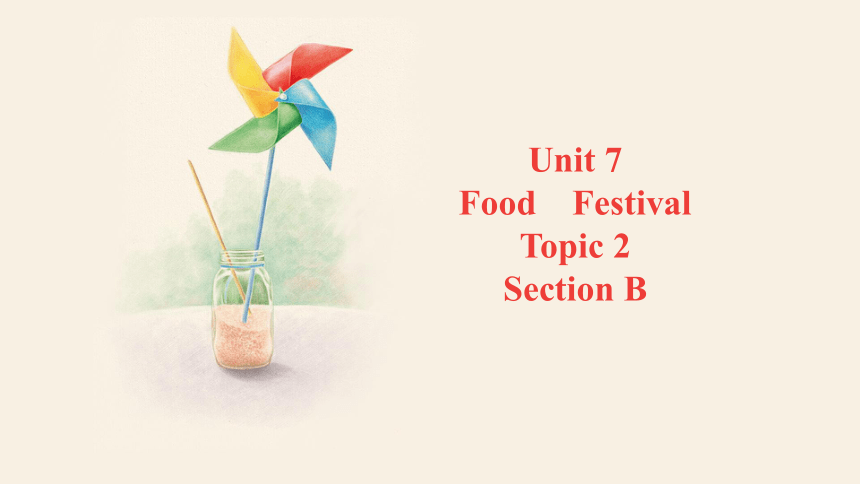 | |
| 格式 | pptx | ||
| 文件大小 | 11.0MB | ||
| 资源类型 | 教案 | ||
| 版本资源 | 仁爱科普版 | ||
| 科目 | 英语 | ||
| 更新时间 | 2024-03-16 09:12:12 | ||
图片预览

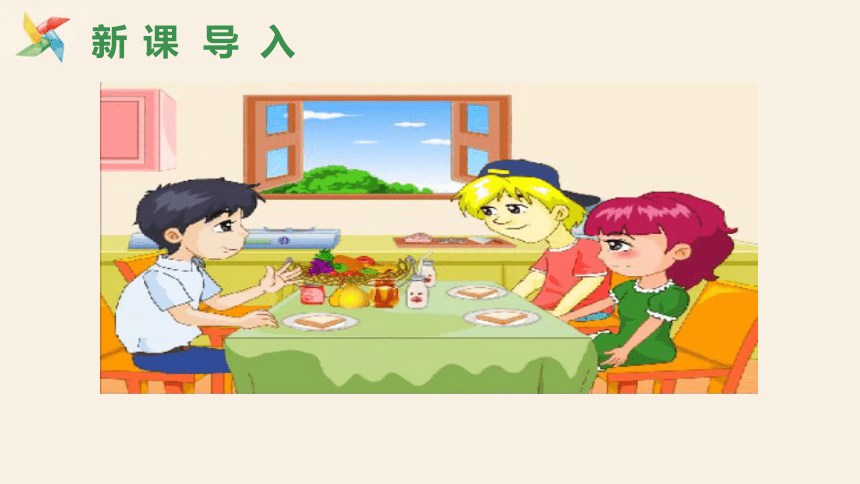



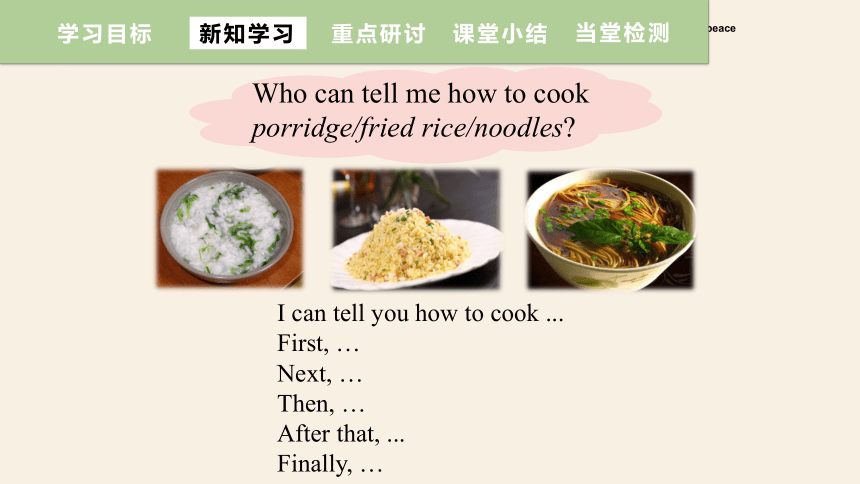

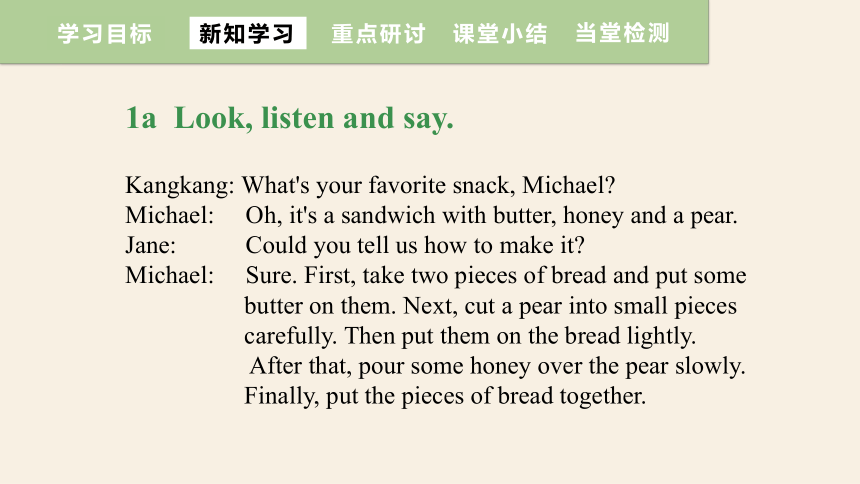
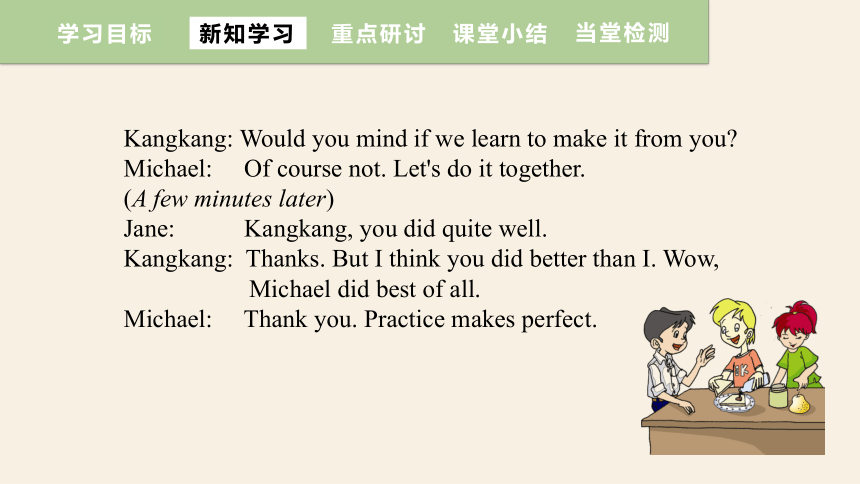
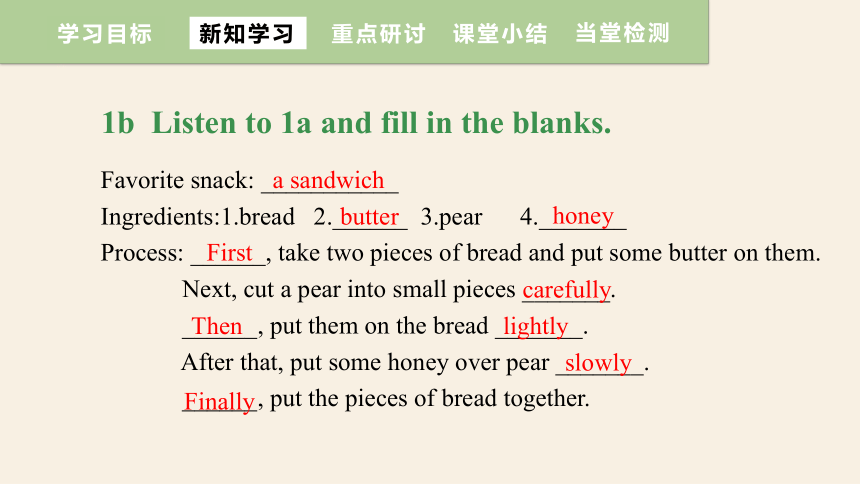
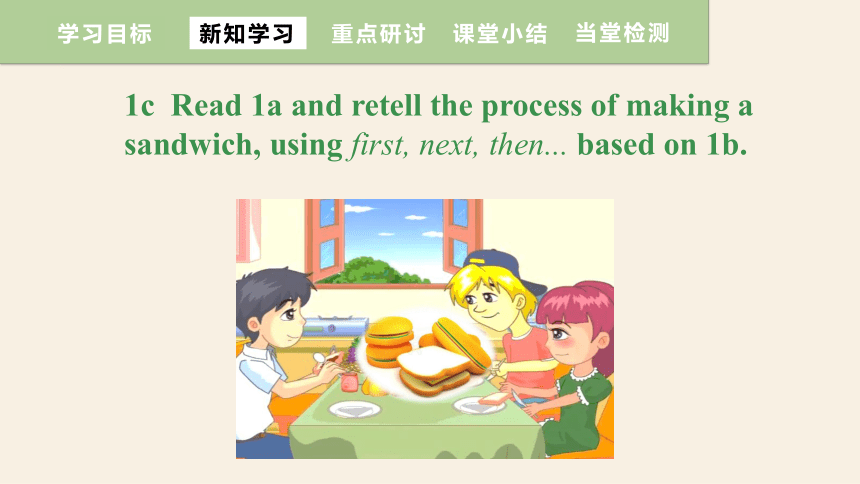
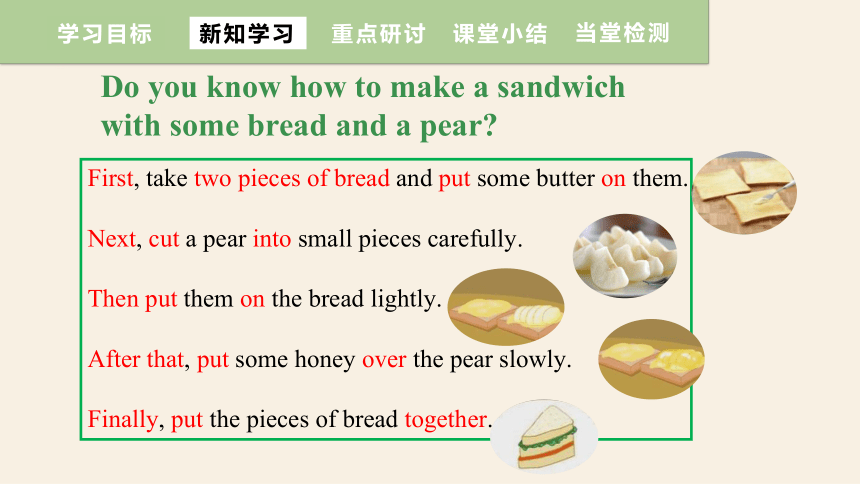
文档简介
(共30张PPT)
Unit 7
Food Festival
Topic 2
Section B
新
课
导
入
新知学习
重点研讨
课堂小结
当堂检测
学习目标
Language Goal
能熟悉并掌握本课时的重点单词和短语
能正确使用 whether/ if 引导的宾语从句
能说出单音节副词的比较级和最高级
能了解不同国家基本的餐桌礼仪
新知学习
重点研讨
课堂小结
当堂检测
学习目标
snack n.小吃
新知学习
重点研讨
课堂小结
当堂检测
学习目标
butter n. 黄油
pear n. 梨
a piece of bread
n.一块(片、张、件......)
honey n. 蜂蜜
/ h ni/
peace
新知学习
重点研讨
课堂小结
当堂检测
学习目标
Who can tell me how to cook
porridge/fried rice/noodles
I can tell you how to cook ...
First, …
Next, …
Then, …
After that, ...
Finally, …
新知学习
重点研讨
课堂小结
当堂检测
学习目标
Who can tell me how to cook
sandwich with butter, honey and a pear
新知学习
重点研讨
课堂小结
当堂检测
学习目标
Kangkang: What's your favorite snack, Michael
Michael: Oh, it's a sandwich with butter, honey and a pear.
Jane: Could you tell us how to make it
Michael: Sure. First, take two pieces of bread and put some
butter on them. Next, cut a pear into small pieces
carefully. Then put them on the bread lightly.
After that, pour some honey over the pear slowly.
Finally, put the pieces of bread together.
1a Look, listen and say.
新知学习
重点研讨
课堂小结
当堂检测
学习目标
Kangkang: Would you mind if we learn to make it from you
Michael: Of course not. Let's do it together.
(A few minutes later)
Jane: Kangkang, you did quite well.
Kangkang: Thanks. But I think you did better than I. Wow,
Michael did best of all.
Michael: Thank you. Practice makes perfect.
新知学习
重点研讨
课堂小结
当堂检测
学习目标
Favorite snack: ___________
Ingredients:1.bread 2.______ 3.pear 4._______
Process: ______, take two pieces of bread and put some butter on them.
Next, cut a pear into small pieces _______.
______, put them on the bread _______.
After that, put some honey over pear _______.
______, put the pieces of bread together.
a sandwich
butter
honey
First
carefully
lightly
Finally
slowly
Then
1b Listen to 1a and fill in the blanks.
新知学习
重点研讨
课堂小结
当堂检测
学习目标
1c Read 1a and retell the process of making a sandwich, using first, next, then... based on 1b.
First, take two pieces of bread and put some butter on them.
Next, cut a pear into small pieces carefully.
Then put them on the bread lightly.
After that, put some honey over the pear slowly.
Finally, put the pieces of bread together.
新知学习
重点研讨
课堂小结
当堂检测
学习目标
Do you know how to make a sandwich with some bread and a pear
新知学习
重点研讨
课堂小结
当堂检测
学习目标
知
识
总结
1.Would you mind if we learn to make it from you
(1)Would you mind if...表示请求允许、或客气地请某人做某事。
例:我打开窗户好吗?
Would you mind if I open the window
(2)learn to do sth. from sb.
向某人学习做某事
例:他向他父亲学习下棋。
He learns to play chess from his father.
新知学习
重点研讨
课堂小结
当堂检测
学习目标
知
识
总结
2. —..., you did quite well.
—But I think you did better than I. Michael did best of all.
句中的well, better, best都是副词,作动词did的状语。 better, best分别是well的比较级和最高级形式。
3. Practice makes perfect. 熟能生巧。
新知学习
重点研讨
课堂小结
当堂检测
学习目标
Michael arrives early.
Kangkang arrives earlier.
Jane arrives earliest.
2 Look at the pictures and match the parts of the sentences.
新知学习
重点研讨
课堂小结
当堂检测
学习目标
Michael stays long.
Kangkang stays longer.
Jane stays longest.
Michael cooks well.
Kangkang cooks better.
Jane cooks best.
新知学习
重点研讨
课堂小结
当堂检测
学习目标
Compare the following things with your friends, then make a report after the example.
go to school/do one’s homework/play basketball/run/cook/... (early/well/fast...)
Example:
Wang Gang and I are good friends.I go to school earlier than him. But he does his homework better than me. ...
新知学习
重点研讨
课堂小结
当堂检测
学习目标
( ) OK, let me try.(Slurp!)
( ) Well, in Cuba, it’s impolite to eat so noisily. I don’t
know if it is polite in Japan.
( ) OK. Mm, it’s delicious. (Slurp!)
( ) Not bad, Maria.
( ) Kumiko, is it too hot
( ) Come on, Kumiko!Help yourself to some soup.
( ) No.Why
( ) Oh.In Japan, it’s polite to do that. It means you like
the food very much.
3 Listen and number the sentences to form a conversation.Then practice with your partner.
1
2
3
4
5
6
7
8
新知学习
重点研讨
课堂小结
当堂检测
学习目标
I don’t know if it is polite in Japan.
我不知道在日本这样是否礼貌。
if/whether引导的宾语从句
这是由if引导的宾语从句,if意为“是否”,不能省略。
if和whether 都可以引导宾语从句,意为“是否”,两者通常能互换,且不可省略。从句表一般疑问的意义。
E.g: 我不能确定是否有不明飞行物。
I’m not sure if there are UFOs.
新知学习
重点研讨
课堂小结
当堂检测
学习目标
◆Understand the following sentences:
I don’t know if/whether I need to obey all the rules while I’m having dinner with my friends.
2. Could you tell me if/whether it’s polite to speak
loudly at the table
3. I don’t know if/whether you are right.
if/whether引导的宾语从句
新知学习
重点研讨
课堂小结
当堂检测
学习目标
cheap——jeep chain——Jane
cheer——jeer choose——juice
4a Read the pairs of words aloud, paying attention to the sounds of the underlined letters. Then listen and try to imitate.
新知学习
重点研讨
课堂小结
当堂检测
学习目标
A:Would you like to tell me how to cook the meal
B:Sure.What do you want to learn
A:Could you teach me how to make fried rice
B:Yes,it's easy.First,cut some cooked meat very finely.Next,put some oil in the pan.Then fry the meat lightly.After that,add the rice slowly and fry it for a few minutes.Finally,add some salt.
A:Yeah! Cooking is fun!
4b Listen and read the conversation, paying attention to the intonation and pause.Then practice with your partner.
Language points
新知学习
重点研讨
课堂小结
当堂检测
学习目标
1. After that, put some honey over the pear slowly.
之后,在梨上慢慢地倒些蜂蜜。
over 在……上, on 也表示“在……上”,但它们二
者有区别,其区别在于:
on 表示“接触于表面的位置”,不是表示垂直关系的
“上”;若要表示垂直分离的“上面”,则要用 over 。
e.g. There is an oil painting on the wall.
墙上有一幅油画。
I reached the little bridge over the stream.
我到达了小溪上的小桥。
新知学习
重点研讨
课堂小结
当堂检测
学习目标
2. Would you mind if we learn to make it from you
你是否介意我们向你学习制作它吗?
Would you mind if 从句或 Would you mind (not) doing sth.
表示请求允许或客气地请某人做某事。意为“你介意…… 吗?”
回答:
不介意:No, of course not. / Certainly not. / Not at all.
介意:Sorry, you'd better not……. / I'm afraid you can't.
e.g. Would you mind if I open the door
你介意我打开门吗?
Would you mind turning on the radio 打开收音机你介意?
新知学习
重点研讨
课堂小结
当堂检测
学习目标
3. Practice makes perfect. 熟能生巧。
此句是一句谚语,英语中有许多谚语。
e.g. Live and learn. 活到老学到老。
Nothing in the world is difficult for one who sets his mind to it.
世上无难事,只怕有心人。
新知学习
重点研讨
课堂小结
当堂检测
学习目标
4. In Cuba, it’s impolite to eat so noisily.
在古巴,吃饭时发出的声音太大是不礼貌的。
impolite 不礼貌的。其反义词为:polite 形容词,“有礼貌的,客气的”。
类似结构的词还有: possible (可能的)/ impossible
(不可能的); patient (有耐心的)/ impatient (没有耐心的);
e.g. He is always polite to others. 他对别人总是很客气。
It would be impolite to leave the party so early.
这么早离开聚会是很不礼貌的。
新知学习
重点研讨
课堂小结
当堂检测
学习目标
5. I don’t know if it’s police in Japan.
我不知道这样做在日本是否礼貌。
if 在此意为“是否”,引导宾语从句,可与 whether 互
换,但 whether 可与 or not 直接连用,而 if 不与 or
not 直接连用。
e.g. I’m sure if/whether he will come tomorrow.
我不确定他明天是否会来。
I’ll see whether she’s at home or not.
我来看看她是不是在家。
新知学习
重点研讨
课堂小结
当堂检测
学习目标
6. Help yourself to some soup. 喝点汤。
help oneself/sb. to sth. 为自己/某人取食品,饮料等。
e.g. Help yourselves to some fruit, children.
孩子们,随便吃些水果吧。
May I help you to some more meat?
再给你来点肉好吗?
新知学习
重点研讨
课堂小结
当堂检测
学习目标
Unit 7 Topic 2
Section B
重点单词与短语:
snack, butter, pear, piece, slurp, impolite, noisily, polite
单音节副词的比较级、最高级:
修饰动词或形容词用1._______ ,两者比较用形容词或副词的2._____级;三者或三者以上比较用3.______级。
副词
比较
最高
表示先后顺序的副词:
1.描述一件事,表示先后顺序的副词:first意为“1.______”, next意为“2.______” Finally意为“3.________”等。
首先
然后
最后
新知学习
重点研讨
课堂小结
当堂检测
学习目标
Helen runs ______ (fast) in her class
Does kate listen to the teacher ____________ (careful) than Lily
3. Did you do _____(well) of all your classmates in the art festival
last week
4. Don’t eat so _______ (noisy) at the table,it isn’t polite.
5. You need to add the rice ______ (slow).
一、用所给词的适当形式填空。
more carefully
best
noisily
fastest
slowly
Unit 7
Food Festival
Topic 2
Section B
新
课
导
入
新知学习
重点研讨
课堂小结
当堂检测
学习目标
Language Goal
能熟悉并掌握本课时的重点单词和短语
能正确使用 whether/ if 引导的宾语从句
能说出单音节副词的比较级和最高级
能了解不同国家基本的餐桌礼仪
新知学习
重点研讨
课堂小结
当堂检测
学习目标
snack n.小吃
新知学习
重点研讨
课堂小结
当堂检测
学习目标
butter n. 黄油
pear n. 梨
a piece of bread
n.一块(片、张、件......)
honey n. 蜂蜜
/ h ni/
peace
新知学习
重点研讨
课堂小结
当堂检测
学习目标
Who can tell me how to cook
porridge/fried rice/noodles
I can tell you how to cook ...
First, …
Next, …
Then, …
After that, ...
Finally, …
新知学习
重点研讨
课堂小结
当堂检测
学习目标
Who can tell me how to cook
sandwich with butter, honey and a pear
新知学习
重点研讨
课堂小结
当堂检测
学习目标
Kangkang: What's your favorite snack, Michael
Michael: Oh, it's a sandwich with butter, honey and a pear.
Jane: Could you tell us how to make it
Michael: Sure. First, take two pieces of bread and put some
butter on them. Next, cut a pear into small pieces
carefully. Then put them on the bread lightly.
After that, pour some honey over the pear slowly.
Finally, put the pieces of bread together.
1a Look, listen and say.
新知学习
重点研讨
课堂小结
当堂检测
学习目标
Kangkang: Would you mind if we learn to make it from you
Michael: Of course not. Let's do it together.
(A few minutes later)
Jane: Kangkang, you did quite well.
Kangkang: Thanks. But I think you did better than I. Wow,
Michael did best of all.
Michael: Thank you. Practice makes perfect.
新知学习
重点研讨
课堂小结
当堂检测
学习目标
Favorite snack: ___________
Ingredients:1.bread 2.______ 3.pear 4._______
Process: ______, take two pieces of bread and put some butter on them.
Next, cut a pear into small pieces _______.
______, put them on the bread _______.
After that, put some honey over pear _______.
______, put the pieces of bread together.
a sandwich
butter
honey
First
carefully
lightly
Finally
slowly
Then
1b Listen to 1a and fill in the blanks.
新知学习
重点研讨
课堂小结
当堂检测
学习目标
1c Read 1a and retell the process of making a sandwich, using first, next, then... based on 1b.
First, take two pieces of bread and put some butter on them.
Next, cut a pear into small pieces carefully.
Then put them on the bread lightly.
After that, put some honey over the pear slowly.
Finally, put the pieces of bread together.
新知学习
重点研讨
课堂小结
当堂检测
学习目标
Do you know how to make a sandwich with some bread and a pear
新知学习
重点研讨
课堂小结
当堂检测
学习目标
知
识
总结
1.Would you mind if we learn to make it from you
(1)Would you mind if...表示请求允许、或客气地请某人做某事。
例:我打开窗户好吗?
Would you mind if I open the window
(2)learn to do sth. from sb.
向某人学习做某事
例:他向他父亲学习下棋。
He learns to play chess from his father.
新知学习
重点研讨
课堂小结
当堂检测
学习目标
知
识
总结
2. —..., you did quite well.
—But I think you did better than I. Michael did best of all.
句中的well, better, best都是副词,作动词did的状语。 better, best分别是well的比较级和最高级形式。
3. Practice makes perfect. 熟能生巧。
新知学习
重点研讨
课堂小结
当堂检测
学习目标
Michael arrives early.
Kangkang arrives earlier.
Jane arrives earliest.
2 Look at the pictures and match the parts of the sentences.
新知学习
重点研讨
课堂小结
当堂检测
学习目标
Michael stays long.
Kangkang stays longer.
Jane stays longest.
Michael cooks well.
Kangkang cooks better.
Jane cooks best.
新知学习
重点研讨
课堂小结
当堂检测
学习目标
Compare the following things with your friends, then make a report after the example.
go to school/do one’s homework/play basketball/run/cook/... (early/well/fast...)
Example:
Wang Gang and I are good friends.I go to school earlier than him. But he does his homework better than me. ...
新知学习
重点研讨
课堂小结
当堂检测
学习目标
( ) OK, let me try.(Slurp!)
( ) Well, in Cuba, it’s impolite to eat so noisily. I don’t
know if it is polite in Japan.
( ) OK. Mm, it’s delicious. (Slurp!)
( ) Not bad, Maria.
( ) Kumiko, is it too hot
( ) Come on, Kumiko!Help yourself to some soup.
( ) No.Why
( ) Oh.In Japan, it’s polite to do that. It means you like
the food very much.
3 Listen and number the sentences to form a conversation.Then practice with your partner.
1
2
3
4
5
6
7
8
新知学习
重点研讨
课堂小结
当堂检测
学习目标
I don’t know if it is polite in Japan.
我不知道在日本这样是否礼貌。
if/whether引导的宾语从句
这是由if引导的宾语从句,if意为“是否”,不能省略。
if和whether 都可以引导宾语从句,意为“是否”,两者通常能互换,且不可省略。从句表一般疑问的意义。
E.g: 我不能确定是否有不明飞行物。
I’m not sure if there are UFOs.
新知学习
重点研讨
课堂小结
当堂检测
学习目标
◆Understand the following sentences:
I don’t know if/whether I need to obey all the rules while I’m having dinner with my friends.
2. Could you tell me if/whether it’s polite to speak
loudly at the table
3. I don’t know if/whether you are right.
if/whether引导的宾语从句
新知学习
重点研讨
课堂小结
当堂检测
学习目标
cheap——jeep chain——Jane
cheer——jeer choose——juice
4a Read the pairs of words aloud, paying attention to the sounds of the underlined letters. Then listen and try to imitate.
新知学习
重点研讨
课堂小结
当堂检测
学习目标
A:Would you like to tell me how to cook the meal
B:Sure.What do you want to learn
A:Could you teach me how to make fried rice
B:Yes,it's easy.First,cut some cooked meat very finely.Next,put some oil in the pan.Then fry the meat lightly.After that,add the rice slowly and fry it for a few minutes.Finally,add some salt.
A:Yeah! Cooking is fun!
4b Listen and read the conversation, paying attention to the intonation and pause.Then practice with your partner.
Language points
新知学习
重点研讨
课堂小结
当堂检测
学习目标
1. After that, put some honey over the pear slowly.
之后,在梨上慢慢地倒些蜂蜜。
over 在……上, on 也表示“在……上”,但它们二
者有区别,其区别在于:
on 表示“接触于表面的位置”,不是表示垂直关系的
“上”;若要表示垂直分离的“上面”,则要用 over 。
e.g. There is an oil painting on the wall.
墙上有一幅油画。
I reached the little bridge over the stream.
我到达了小溪上的小桥。
新知学习
重点研讨
课堂小结
当堂检测
学习目标
2. Would you mind if we learn to make it from you
你是否介意我们向你学习制作它吗?
Would you mind if 从句或 Would you mind (not) doing sth.
表示请求允许或客气地请某人做某事。意为“你介意…… 吗?”
回答:
不介意:No, of course not. / Certainly not. / Not at all.
介意:Sorry, you'd better not……. / I'm afraid you can't.
e.g. Would you mind if I open the door
你介意我打开门吗?
Would you mind turning on the radio 打开收音机你介意?
新知学习
重点研讨
课堂小结
当堂检测
学习目标
3. Practice makes perfect. 熟能生巧。
此句是一句谚语,英语中有许多谚语。
e.g. Live and learn. 活到老学到老。
Nothing in the world is difficult for one who sets his mind to it.
世上无难事,只怕有心人。
新知学习
重点研讨
课堂小结
当堂检测
学习目标
4. In Cuba, it’s impolite to eat so noisily.
在古巴,吃饭时发出的声音太大是不礼貌的。
impolite 不礼貌的。其反义词为:polite 形容词,“有礼貌的,客气的”。
类似结构的词还有: possible (可能的)/ impossible
(不可能的); patient (有耐心的)/ impatient (没有耐心的);
e.g. He is always polite to others. 他对别人总是很客气。
It would be impolite to leave the party so early.
这么早离开聚会是很不礼貌的。
新知学习
重点研讨
课堂小结
当堂检测
学习目标
5. I don’t know if it’s police in Japan.
我不知道这样做在日本是否礼貌。
if 在此意为“是否”,引导宾语从句,可与 whether 互
换,但 whether 可与 or not 直接连用,而 if 不与 or
not 直接连用。
e.g. I’m sure if/whether he will come tomorrow.
我不确定他明天是否会来。
I’ll see whether she’s at home or not.
我来看看她是不是在家。
新知学习
重点研讨
课堂小结
当堂检测
学习目标
6. Help yourself to some soup. 喝点汤。
help oneself/sb. to sth. 为自己/某人取食品,饮料等。
e.g. Help yourselves to some fruit, children.
孩子们,随便吃些水果吧。
May I help you to some more meat?
再给你来点肉好吗?
新知学习
重点研讨
课堂小结
当堂检测
学习目标
Unit 7 Topic 2
Section B
重点单词与短语:
snack, butter, pear, piece, slurp, impolite, noisily, polite
单音节副词的比较级、最高级:
修饰动词或形容词用1._______ ,两者比较用形容词或副词的2._____级;三者或三者以上比较用3.______级。
副词
比较
最高
表示先后顺序的副词:
1.描述一件事,表示先后顺序的副词:first意为“1.______”, next意为“2.______” Finally意为“3.________”等。
首先
然后
最后
新知学习
重点研讨
课堂小结
当堂检测
学习目标
Helen runs ______ (fast) in her class
Does kate listen to the teacher ____________ (careful) than Lily
3. Did you do _____(well) of all your classmates in the art festival
last week
4. Don’t eat so _______ (noisy) at the table,it isn’t polite.
5. You need to add the rice ______ (slow).
一、用所给词的适当形式填空。
more carefully
best
noisily
fastest
slowly
同课章节目录
- Unit 5 Feeling excited
- Topic 1 You look excited
- Topic 2 I’m feeling better now.
- Topic 3 Many things can affect our feelings.
- Unit 6 Enjoying Cycling
- Topic 1 We're going on a three-day visit to Mount
- Topic 2 How about exploring Tian’anmen Square?
- Topic 3 Bicycle riding is good exercise.
- Unit 7 Food festival
- Topic 1 We’re preparing for a food festival.
- Topic 2 I’m not sure whether I can cook it well.
- Topic 3 I Cooked the Most Successfully
- Unit 8 Our Clothes
- Topic 1 We will have a class fashion show.
- Topic 2 We can design our own uniforms.
- Topic 3 He said the fashion show was wonderful.
